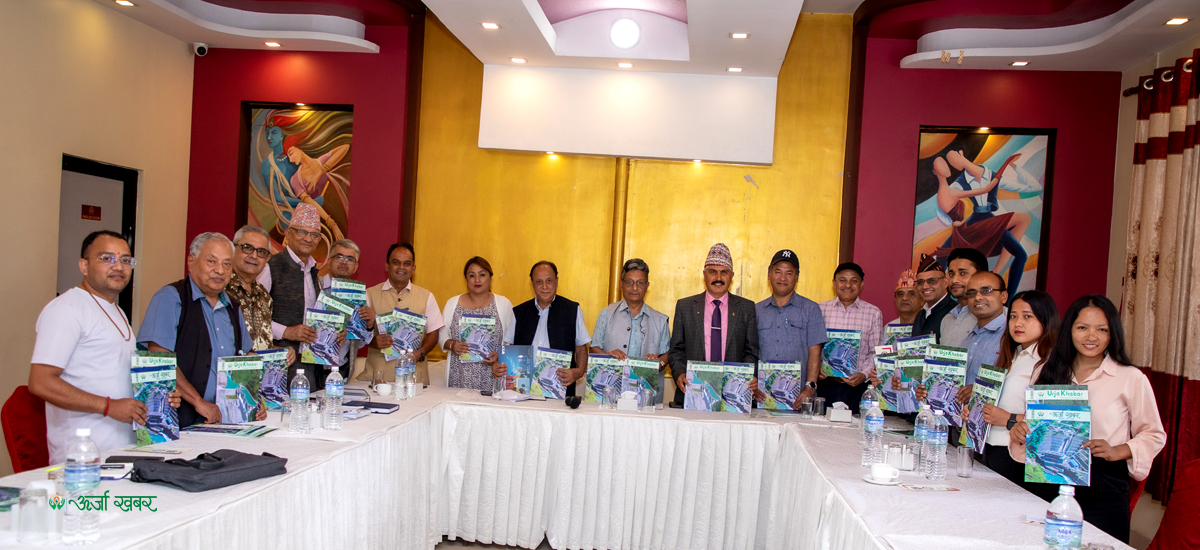
Kathmandu; The apathy of the government authorities and the absence of laws in the country have resulted in a poor distribution system, which has led to the wastage of large amounts of the produced electricity in the country.
Experts from the energy sector expressed the view in an interaction organized by the Urja Khabar whille lunching forth issue of its print edition on Wednesday. According to them, the government giving more priority to license the hydropower projects without considering the distribution side has led to the problem.

In an interaction programme Mukesh Raj Kafle, former managing director of the Nepal Electricity Authority (NEA) said Nepal is facing a waste of around 1,000 MW of electricity on a daily basis due to not having a proper transmission line and distribution mechanism. “Out of around 2,600 MW of electricity available around the clock, Nepal is facing a spill out of 500 MW of electricity during peak hours, while 1,400 MW during off-peak hours.
Despite facing the spill out of electricity, Nepal is importing power from India whereas the industries have been facing unannounced load shedding at the same time. “In addition, consumers have been facing a problem of tripping despite having surplus production of electricity in the country,” said Kafle, adding that the main problem is with the inadequate and inefficiency of the related infrastructure.

Experts said the lack of proper planning by the government has led to a shortfall in meeting the target even in electricity production. Earlier, the government had announced to increase electricity production to 10,000 MW by 2025. However, it seems that the production will reach hardly 3,200 MW within the stipulated time.
The NEA has estimated an average of Rs 50-60 billion to construct infrastructures including east-west transmission, cross-border lines and a number of internal substations to ease electricity supply in the Kathmandu valley. “The problem lies not only in the construction of infrastructures but also in their operations,” said Dipak Gyawali, former water resources minister and an expert on hydro policies.
According to him, there is a growing domestic demand for large investments in energy development, but potential sources of foreign investment are being closed. The Russia-Ukraine war has made it even more problematic. “Now, we have to think about how to raise and collect investment from within the country. So far, we have shown the least concern to the distribution system and transmission lines,” said Gyawali, adding that the transmission and distribution lines can be improved only if the social issues related to it are fixed.
Suman Prasad Sharma, former secretary of the Government of Nepal, said the country has now reached a stage of surplus from shortage management of energy. Transmission and distribution lines are not healthy. “So, transformers, conductors and other related equipment had to be changed overnight. This is the area where we have to work promptly.”
Sharma opined that reservoir projects are a must for sustainable power supply. “Time and again, we have been stressing the need to build a reservoir project, but it has not progressed to the date. We have a list of such projects, but have remained only in paper.”
According to Sharma, the government has failed to pay attention to reservoir projects, which have multi-faceted benefits. “Unless we go into them, there will not be major changes in the sustainability of our power supply,” he added.
Although the government has been expressing its words to prioritize domestic consumption to safeguard investment in the hydropower sector, it is not happening in reality. “If the government ensures reliable distribution, the consumption could be boosted up,” said Hitendra Dev Shakya, managing director of the NEA.
The absence of a proper legal framework has also been a hindrance to the development of the country’s energy sector. Although the new electricity bill has been drafted, it has failed to get the approval of the parliament in the past one and a half decades.
Dilli Bahadur Singh, chairperson of the Electricity Regulatory Commission, said a small revision in the existing Electricity Act will do a lot in the development of the sector. He said lack of coordination among the government authorities is among the problems in the development of the transmission lines and distribution mechanism of electricity.
Jagannath Shrestha, professor at the Institute of Engineering, Pulchowk, said the government now needs to focus on promoting the mixed energy of hydropower and solar power in order to ensure a reliable distribution system. “As many households in urban areas, in particular, can install solar power panels, the government should provide subsidies for them,” he said.
The sector’s analysts said there are many challenges in policy reforms in the energy sector, which are needed to be addressed as soon as possible.
Former Finance Minister Shankar Prasad Koirala said electricity business should be opened facilitating the participation of the private sector as well. “As of now, the NEA guarantees to purchase only 90 percent of the total connected capacity. Private sectors should be given the flexibility to trade the remaining 10 percent of electricity,” Koirala said.
According to him, the country is now facing a big problem of funding in the context of the government forwarding the plan of producing 20,000 MW of electricity in 10 years. This requires an investment of billions of rupees, which does not seem possible only with domestic capital.